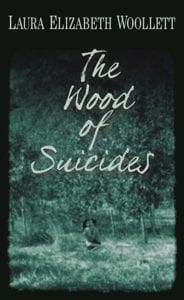
A schoolgirl’s crush on her male English teacher leads to mutual destructive obsession in this well-drawn, compelling debut novel.
Shelf Unbound: Tell us about your main character, Laurel Marks.
Laura Elizabeth Woollett:At face value, Laurel is a bright, attractive, modest, and well-behaved seventeen-year-old. Beneath the surface, she is calculating, vain, jealous, and judgmental, particularly toward other women. Beneath that, she is a bundle of insecurities, and more naïve than she’s willing to admit.
Despising her mother and identifying with her father, Laurel is all too eager to begin an affair with an older man. She doesn’t particularly enjoy the intimacy, but becomes addicted to other aspects of the relationship—the admiration, the power plays, and the sense of doing something illicit and out of the ordinary. She sees herself as a tragic figure, a sort of martyr or romantic heroine, out of touch with the world and not long for it. Death is never far from her mind.
Shelf Unbound: How did you go about creating Laurel?
Woollett: Laurel comes from a place that is very familiar to me. I wasn’t nearly as intense when I was her age, but I did share many of her preoccupations. Like her, I craved sophistication. I considered myself more intelligent than my peers. I had an all-or-nothing mindset and was drawn to extremes. I romanticized death.
A lot of teenagers think this way, I’m sure. It comes with the territory. Laurel differs mostly in her intensity and her circumstances; she’s privileged, but also very isolated. This allows her to become more set in her ways.
Shelf Unbound: You began writing this novel when you were a teenager, and you are now 24. How did your personal maturation influence the style or direction of the novel as you worked
on it over the years?
Woollett:At 18, I wanted to write a novel about a girl exploring her sexuality after the death of her father. I had read Sylvia Plath. I had read Lolita. It seemed like a good subject.
I wrote about 50 pages. They were rubbish. After starting university, I put them aside and didn’t pick them up again until halfway through my degree. By that point, I had read more. I could write better. I was older than my main character, which allowed me to look at her more critically and turn her faults into fatal flaws.
About five of those original pages were reworked into the opening of The
Wood of Suicides. I scrapped the rest. The greater part of my novel was written between the ages of 20 and 23.
Shelf Unbound: Has being a Millennial influenced your writing or your ideas about what you want your literary career to look like?
Woollett: I don’t feel any particular affinity for my generation or desire to speak for it. The subjects that intrigue me most are timeless—sex, death, beauty, violence, corruption. More often than not, my characters live in a different or unspecified era. Even The Wood of Suicides isn’t exactly contemporary; it’s set in the early 2000s, before the social media revolution. Perhaps I could have had Laurel and Mr. Steadman Facebook-stalking each other and sexting, but I feel that would have been a distraction, and I liked that they still exchanged letters and that sort of thing. It’s another way in which they’re invested in fantasy over reality.
There are writers who do a great job of capturing what it’s like to be a Millennial and engaging with contemporary issues. I read them sometimes, but I’m not really one of them. For whatever reason, I don’t feel compelled or equipped to write about the Millennial experience—at least not directly.
Shelf Unbound: You write poetry and short fiction as well. How did the experience of writing a novel differ from writing shorter pieces?
Woollett:When you’re writing a novel, everything is very big picture. You can have a clear idea of the themes, the main characters, and the most dramatic events, but a lot more world-building needs to be done to make these things plausible. Most novels have minor characters, whereas short stories can usually dispense with these. I found this a challenge of writing The Wood of Suicides, since I’m most comfortable dealing with a cast of about two or three.
Short fiction has other challenges. The focus is narrower and everything needs to be there for a reason. At the moment, I’m writing a lot of true crime inspired fiction, trying to condense hundreds of pages of research into a few thousand words. It’s very difficult to decide where to place my focus, what to reveal and what to leave unsaid.
Shelf Unbound: You’re working on a collection of short stories titled The Love of a Bad Man, which could have been a subtitle for The Wood of Suicides. What draws you to this subject?
Woollett:I first read Silence of the Lambs and Hannibal about 10 years ago, and was fascinated by the relationship between Clarice Starling and Hannibal Lecter. Later, Wuthering Heights became a favorite. I liked how cruel Heathcliff was, but also how Catherine saw herself in him and identified with his cruelty.
I’m not so much interested in stories of good girls falling for bad guys as girls who already have something bad in them and find themselves in these relationships. These girls are far more compelling to me, since they’re not just blank, virginal slates. They’re human, with the potential to act inhumanely.
